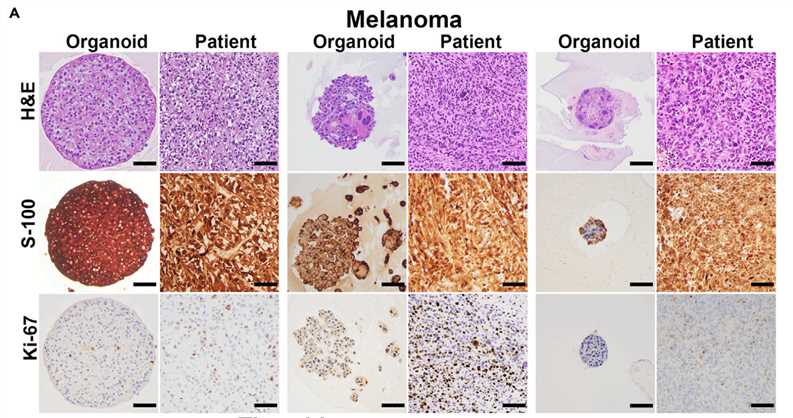All products and services are For Research Use Only and CANNOT be used in the treatment or diagnosis of disease.
Melanoma is one of the malignant skin cancers, and almost 75% death of skin cancer is related to metastatic melanoma. Melanoma is generated from neural crest stem cells (NCSCs) and can migrate to the brain and lungs, causing an extreme decrease in survival rate in patients. Immunotherapies have been developed to target metastatic melanoma, and proper preclinical models are urgently needed for therapy investigation. Creative Biolabs provides well-established melanoma organoids for routine use as models to predict the response and resistance present in cancer patients.
 Fig.1 Illustrative workflow of our cancer organoids-mediated in vitro CAR-T efficacy test service. (Zhou, et al., 2021)
Fig.1 Illustrative workflow of our cancer organoids-mediated in vitro CAR-T efficacy test service. (Zhou, et al., 2021)
We provide a complete characterization of established melanoma organoids and initial tumor tissue, using recently advanced technologies.
| Characteristics | Description |
| Morphology | Hematoxylin and eosin staining and brightfield images are used to analyze the structure of organoids and primary tumor tissue. |
| Viability | Staining live/dead cells with specific dyes; measure cell apoptosis using specific antibodies and kits. |
| Histological Feature | Immunohistochemical staining is applied to detect melanoma-specific biomarkers, such as S100 beta, Melan-A, and tyrosinase, as well as other cell components. |
| Genetic Mutations | Using multiple omics techniques to study gene mutations, copy-number variations, including top mutant genes, BRAFV600, NRAS, and NF-1. |
Cancer organoids retain the biological features of tumor tissue and are easy to manipulate. They have become the most popular in vitro models for immunotherapy assessment. We provide the following analysis methods for CAR-T efficacy tests.
Creative Biolabs provides targeted CAR-T products and one-stop CAR-T development services on various cancers, this table shows the melanoma-related targets and corresponding CAR-T products for in vitro anti-tumor function tests using our cancer organoid platform.
| Target Antigen | Target Description | CAR-T Products |
| HER2 | HER2 is human epidermal growth factor receptor-2 encoded by the ERBB2 gene and is expressed in melanoma during tumor progression and metastases stages. | Anti-HER2 CAR-T |
| GD2 | GD2, named ganglioside G2 or GRD2, is expressed in many melanoma cells and serves as a potential target for CAR-T therapy. | Anti-GD2 CAR-T |
| VEGFR-2 | Vascular endothelial growth factor-2(VEGFR-2) is present in almost 90% of human melanoma cells and is a proper target for controlling tumor growth. | Anti-VEGFR-2 CAR-T |
| CD20 | Data shows that CD20 is expressed on subtypes of melanomas with stem cell phenotype or tumorigenesis characteristics. | Anti-CD20 CAR-T |
| Gp100 | Gp100 is a type I transmembrane glycoprotein expressed on melanoma cells and is verified as a therapeutic target for uveal melanoma. | Anti-Gp100 CAR-T |
| GPC3 | Glypican-3 (GPC3) is a biomarker of liver cancer and has been demonstrated to be expressed in nearly 40% of melanoma patients. | Anti-GPC3 CAR-T |
| CSPG4 | CSPG4, chondroitin sulfate proteoglycan 4, is a highly antigenic transmembrane proteoglycan expressed on melanoma cells' surface, which affects tumor formation and progression. | Anti-CSPG4 CAR-T |
| CD70 | CD70 is expressed on activated immune cells and primary and metastases melanomas, which involves melanoma invasion function. | Anti-CD70 CAR-T |
| Establishing Patient-derived Melanoma Organoids with the Minimized Process of Tissue |
| Sampling strategy: Take tumor samples with minimally invasive technology. |
| Culture condition: Matrigel mediated culture in medium containing DMEM, Hams, F12, MCDB105, FBS, and B27 supplement. |
| Advantages: Avoid digestion process; retaining the complexity and growth pattern of the primary tumor. |
 Fig.2 Melanoma organoids retain the histological and immunophenotype features of the parental tumor. (Vilgelm, et al., 2020) |
Creative Biolabs offers a high-quality cancer organoids platform for CAR-T efficacy tests. Please contact us and get more detailed information.
References
For any technical issues or product/service related questions, please leave your information below. Our team will contact you soon.
 NEWSLETTER
NEWSLETTER
The latest newsletter to introduce the latest breaking information, our site updates, field and other scientific news, important events, and insights from industry leaders
LEARN MORE NEWSLETTER NEW SOLUTION
NEW SOLUTION
CellRapeutics™ In Vivo Cell Engineering: One-stop in vivo T/B/NK cell and macrophage engineering services covering vectors construction to function verification.
LEARN MORE SOLUTION NOVEL TECHNOLOGY
NOVEL TECHNOLOGY
Silence™ CAR-T Cell: A novel platform to enhance CAR-T cell immunotherapy by combining RNAi technology to suppress genes that may impede CAR functionality.
LEARN MORE NOVEL TECHNOLOGY NEW SOLUTION
NEW SOLUTION
Canine CAR-T Therapy Development: From early target discovery, CAR design and construction, cell culture, and transfection, to in vitro and in vivo function validation.
LEARN MORE SOLUTION